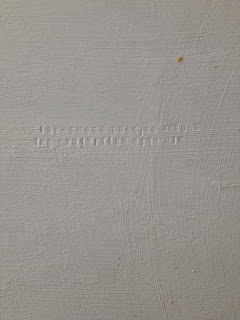Tuesday, 9 June 2015
Salt. Film
Alongside my text on canvases, I produced a series of short abstract films exploring separation, and the paradox between chaos and order. I chose to use my mother as my subject, for to me she represents a strong woman yet separated within herself. I filmed her attempting to separate salt; a substance which is near impossible to place into an order. I intend to leave the footage raw without any editing, and to erase any sound the camera picked up.
The feedback I received from my fellow fine artists on my films were very positive. For some, the film evoked a sensory response, and it was interesting to see the salt making no commitment to the canvas upon which it was being divided upon. Overall, I am very pleased with the films, and will pursue the next step in installing both the film and the canvases into my exhibition space.
Embodying Disjunction
Swimming in the Dark
Experimenting with heavy moulding paint #2
When working with the heavy moulding paint, I realised that I had to make sure that the surface of the paint was completely smooth, so that the attention of the viewer would be drawn not to any marks or contours in the paint, but to the text. Unfortunately, my first attempt at applying the paint to the wooden canvas did not achieve the desired effect I was hoping for, and instead of a flat surface, the paint dried to the contours of the pallete knife I had applied with. As much as the I felt that the contours did add an interesting feature to the piece, overall I was determined to achieve a smoother look. And so, I began experimenting with different tools upon which to apply the mixture; the most successful being a window cleaner in the shape of a squeegee. In addition, I was not sure whether I wanted to layer the text, or to leave it in its own right, still fairly obscured by the white pigment.
Experimentation with Heavy Moulding Paint
After experimenting with embossing wallpaper with metal letter punches and MDF, I researched exactly what medium Idris Khan used in his piece, 'Untitled, White on white' from the Conflicting Lines Exhibition. I then began experimenting with a mixture of heavy moulding paint and white acrylic after it was half dried onto a canvas, and used metal letter punches to make textual impressions. The text I was using was a version of my memories that I had typed out over and over again, and thus my thinking behind this was that the viewer could touch a memory; evoking a strange paradox between stable and unstable.
I found the process of stamping the metal letter punches into the drying mixture much more time effective than the wall paper. Initially, I experimented on MDF, and then went on to use wooden box canvases.
I found the process of stamping the metal letter punches into the drying mixture much more time effective than the wall paper. Initially, I experimented on MDF, and then went on to use wooden box canvases.
Experimentation with Impressions
In terms of experimenting with making textual impressions onto a surface, I began by hammering metal letter punches onto a strip of wallpaper with a layer of MDF underneath. The results were pleasing, as I achieved a deep impressions onto the wallpaper as well as clean impressions onto the MDF. Unfortunately this process was highly time consuming, and thus I was compelled to find another method of achieving similar results to keep within a realistic time frame.
Visit to... Idris Khan's Conflicting Lines, Victoria Miro April 2015
Without a doubt, my visit to this exhibition was the most influential in helping me to shape my final major project. Idris Khan is renowned for his works across medium including sculpture, painting and photography, all encompassing his layering technique to 'arrive at the essence of the image'. The exhibition. 'Conflicting Lines' held at the Victoria Miro Gallery featured large scale composite photographs made from a series of oil stick paintings. Khan went through the process of overlaying the lines of the writing repeatedly until the text became obscured; a technique which I had previously experimented with. Walking through the gallery, a single piece of work particularly drew me in, 'Untitled, White on white'; a large painting on aluminium, with layers of text radiating from a centre point. The fact that both the writing and the oil based relief ink were a blinding shade of white left the text utterly obscured, and upon touching the canvas, I realised that one could feel the subtle impressions of the text stamped into the relief ink.

Upon seeing this piece of work, I knew that I wanted to pick up my work with text and take it a step further. In effect, I would be producing two pieces for my final major project; a film and an installation, both of which would have to poetically compliment the other.
Upon seeing this piece of work, I knew that I wanted to pick up my work with text and take it a step further. In effect, I would be producing two pieces for my final major project; a film and an installation, both of which would have to poetically compliment the other.
Subscribe to:
Comments (Atom)










